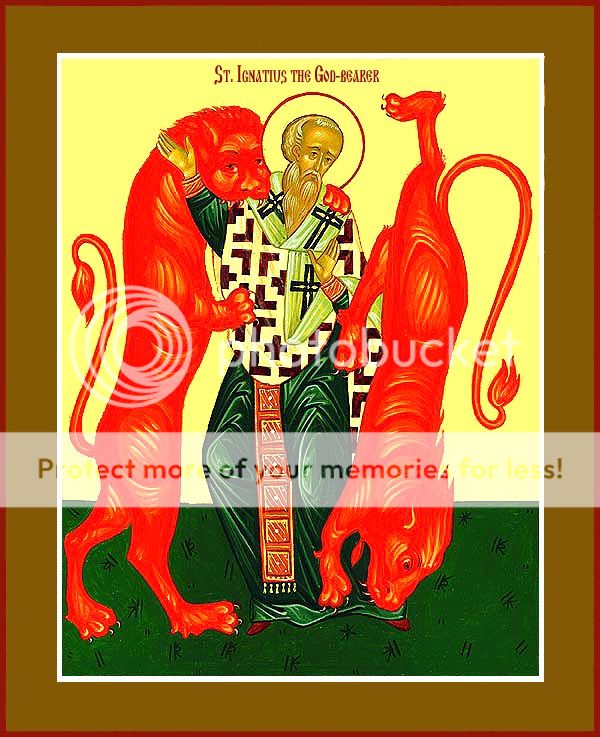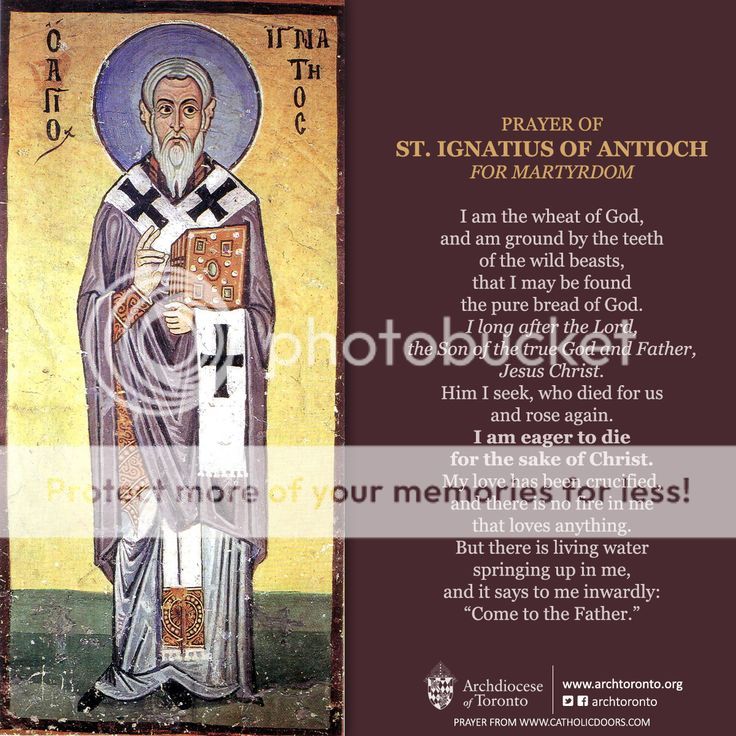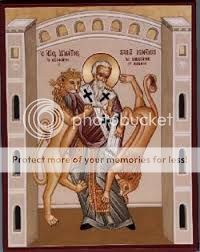Whilst on his way to Rome for his Martyrdom he wrote seven letters:
- The Letter to the Ephesians,
- The Letter to the Magnesians,
- The Letter to the Trallians,
- The Letter to the Romans,
- The Letter to the Philadelphians,
- The Letter to the Smyrnaeans,
- The Letter to Polycarp, Bishop of Smyrna.
He clearly taught the Divinity of Christ in his Letter to the Ephesians,
There is one Physician who is possessed both of flesh and spirit; both made and not made; God existing in flesh; true life in death; both of Mary and of God; first passible and then impassible, even Jesus Christ our Lord. —Letter to the Ephesians, ch. 7,
giving the lie to the Modernists' insistence that the concept of the Godhead of Christ was a later development. He sat at the feet of the Beloved Disciple, who wrote,
In the beginning was the Word, and the Word was with God, and the Word was God,
so who better to know what the Apostles taught regarding Christ?
Also, in the same Letter he writes,
breaking one and the same bread, which is the medicine of immortality, and the antidote to prevent us from dying, but [which causes] that we should live for ever in Jesus Christ.—Letter to the Ephesians, ch. 20.And in the Letter to the Smyrnaeans, he writes,
Take note of those who hold heterodox opinions on the grace of Jesus Christ which has come to us, and see how contrary their opinions are to the mind of God ... They abstain from the Eucharist and from prayer because they do not confess that the Eucharist is the flesh of our Savior Jesus Christ, flesh which suffered for our sins and which that Father, in his goodness, raised up again. They who deny the gift of God are perishing in their disputes. — Letter to the Smyrnaeans 6:2–7:1,echoing what his Teacher recorded of the Words of Our Blessed Lord and Saviour in his Gospel, Chapter 6,
[47] Amen, amen I say unto you: He that believeth in me, hath everlasting life. [48] I am the bread of life. [49] Your fathers did eat manna in the desert, and are dead. [50] This is the bread which cometh down from heaven; that if any man eat of it, he may not die.
[51] I am the living bread which came down from heaven. [52] If any man eat of this bread, he shall live for ever; and the bread that I will give, is my flesh, for the life of the world. [53] The Jews therefore strove among themselves, saying: How can this man give us his flesh to eat? [54] Then Jesus said to them: Amen, amen I say unto you: Except you eat the flesh of the Son of man, and drink his blood, you shall not have life in you. [55] He that eateth my flesh, and drinketh my blood, hath everlasting life: and I will raise him up in the last day.
In the Letter to the Magnesians, he makes clear that all three degrees of the Sacrament of Holy Orders existed in his time, and it can be safely assumed that he learned this from the Apostle,
Take care to do all things in harmony with God, with the bishop presiding in the place of God, and with the presbyters in the place of the council of the apostles, and with the deacons, who are most dear to me, entrusted with the business of Jesus Christ, who was with the Father from the beginning and is at last made manifest — Letter to the Magnesians 2, 6:1,proving false any number of protestant heresies regarding the Apostolic governance of the Church.
And, finally, in his Letter to the Smyrnaeans, he is the first to use the word 'Catholic' to refer to the Church,
Wherever the bishop appears, there let the people be; as wherever Jesus Christ is, there is the Catholic Church. It is not lawful to baptize or give communion without the consent of the bishop. On the other hand, whatever has his approval is pleasing to God. Thus, whatever is done will be safe and valid. — Letter to the Smyrnaeans 8,making it obviousl that the form of government of the Church, as transmitted by a disciple of an Apostle, is the same form of government Christ's Church has today, faithfully transmitted, handed over, and given for safekeeping (Latin tradere, whence traditio, English Tradition) for two millenia.
His Feast Day is 1 Febrary, and here is the 3rd Lesson from Matins of his Office in the Roman Breviary.
Ignatius, chosen to be the second successor of Peter as bishop of Antioch, was accused of being a Christian during Trajan's reign and condemned to be sent to the beasts in Rome. As he was being brought from Syria in chains, he kept teaching all the cities of Asia which he went through, exhorting them as a messenger of the Gospel and instructing the more distant ones by his letters. In one of these letters, which he wrote to the Romans from Smyrna while he was enjoying Polycarp's companionship, among other matters he said this about his own death sentence: "O helpful beasts that are being made ready for me! when will they come? When will they be sent out? When will they be allowed to devour my flesh And I hope that they will be made the more fierce, lest by chance, as has happened in the case of others, they may fear to touch my body. Now I am beginning to be Christ's disciple. Let fire, crosses, beasts, the tearing apart of my limbs, the torment of my whole body and all the sufferings prepared by the devil's art be heaped upon me all at once, if only I may attain Jesus Christ. When he had arrived in Rome, he heard the lions roaring and, burning with desire for martyrdom, he burst out, "I am the wheat of Christ; let me be ground by the teeth of the beasts so that I may be found pure bread." He suffered in the eleventh year of Trajan's reign.




No comments:
Post a Comment
Comments are subject to deletion if they are not germane. I have no problem with a bit of colourful language, but blasphemy or depraved profanity will not be allowed. Attacks on the Catholic Faith will not be tolerated. Comments will be deleted that are republican (Yanks! Note the lower case 'r'!), attacks on the legitimacy of Pope Leo XIV as the Vicar of Christ, the legitimacy of the House of Windsor or of the claims of the Elder Line of the House of France, or attacks on the legitimacy of any of the currently ruling Houses of Europe.